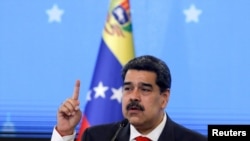Venezuelan leader Nicolas Maduro said his government would not give in to "blackmail or threats" after the United States urged him to make serious efforts toward holding elections if he wants sanctions relief.
Washington's call comes ahead of a Friday meeting in Mexico between representatives of both the leftist government and opposition leader Juan Guaido -- considered interim president by the United States -- before talks set for August 30 under mediation from Norway.
Venezuela is suffering through a crippling economic crisis, exacerbated by a raft of fresh sanctions imposed by Washington following a contested election in 2018.
In a state television broadcast, Maduro said his country would go to the talks "autonomously and independently and does not submit to blackmail or threats from the United States government."
Earlier, Maduro said he was seeking an "immediate lifting of all the criminal sanctions" led by the United States, which in 2019 said it no longer considered him the legitimate president after wide allegations of electoral irregularities.
State Department spokesman Ned Price said the sanctions were aimed at "promoting accountability" on democracy and human rights.
"We've also been clear that the Maduro regime can create a path to easing sanctions by allowing Venezuelans to participate in long overdue free and fair presidential, parliamentary and local elections," Price told reporters.
Doing so "requires the Maduro regime to engage in sincere discussions with the opposition -- led by, of course, Interim President Juan Guaido -- that result in a comprehensive negotiated solution to the Venezuelan crisis," he said.
Guaido is seeking guarantees over electoral conditions as well as the release of political prisoners including Freddy Guevara, who was recently detained.
'For our political prisoners'
Guaido declared himself Venezuela's president in 2019 through his position as parliament speaker.
The opposition-dominated parliament had claimed Maduro's 2018 re-election was fraudulent, a view shared by the European Union and the United States.
Former US president Donald Trump, vowing to crush leftists across the Americas, imposed sweeping sanctions to pressure Maduro including on Venezuela's key export of oil.
But Maduro has withstood the pressure with support from the nation's military, Russia, China and Cuba despite a crumbling economy that has caused millions to flee.
Biden has largely kept in place Trump's stance on Venezuela while promising a more nuanced approach that relies on US allies.
Neither Maduro or Guaido will attend the latest talks, and the government holds most of the cards.
In a video retweeted on his official Twitter account, Guaido said: "Today there is unity in Venezuela supporting the possibility of a solution through a comprehensive agreement."
In a later tweet, he wrote: "For our country, for our political prisoners, for the struggle and the sacrifice of thousands, we are going to rise up and move on until we achieve it."
The government and the opposition last held negotiations in Barbados in 2019 that were also mediated by Norway and failed to make a breakthrough.




